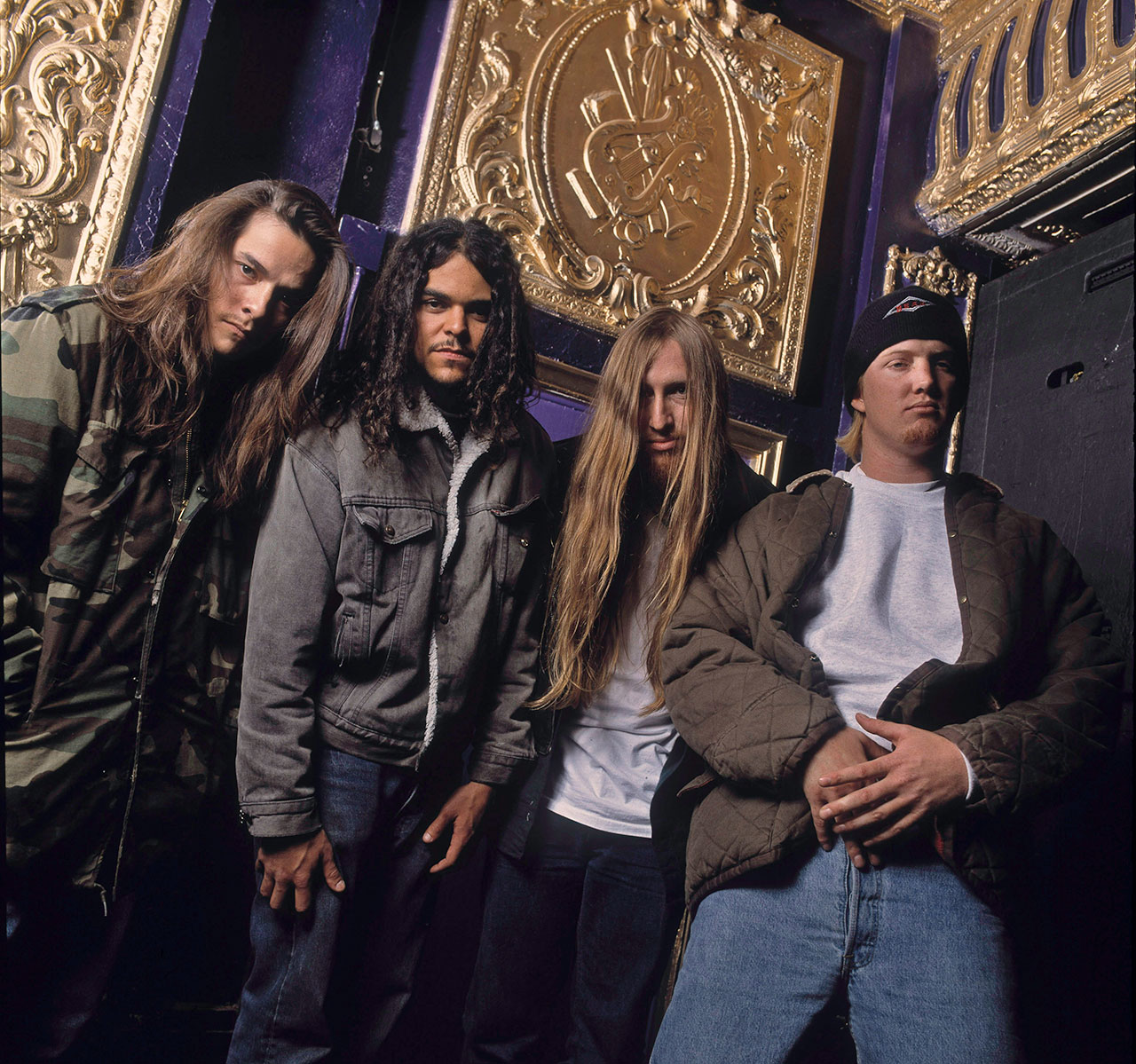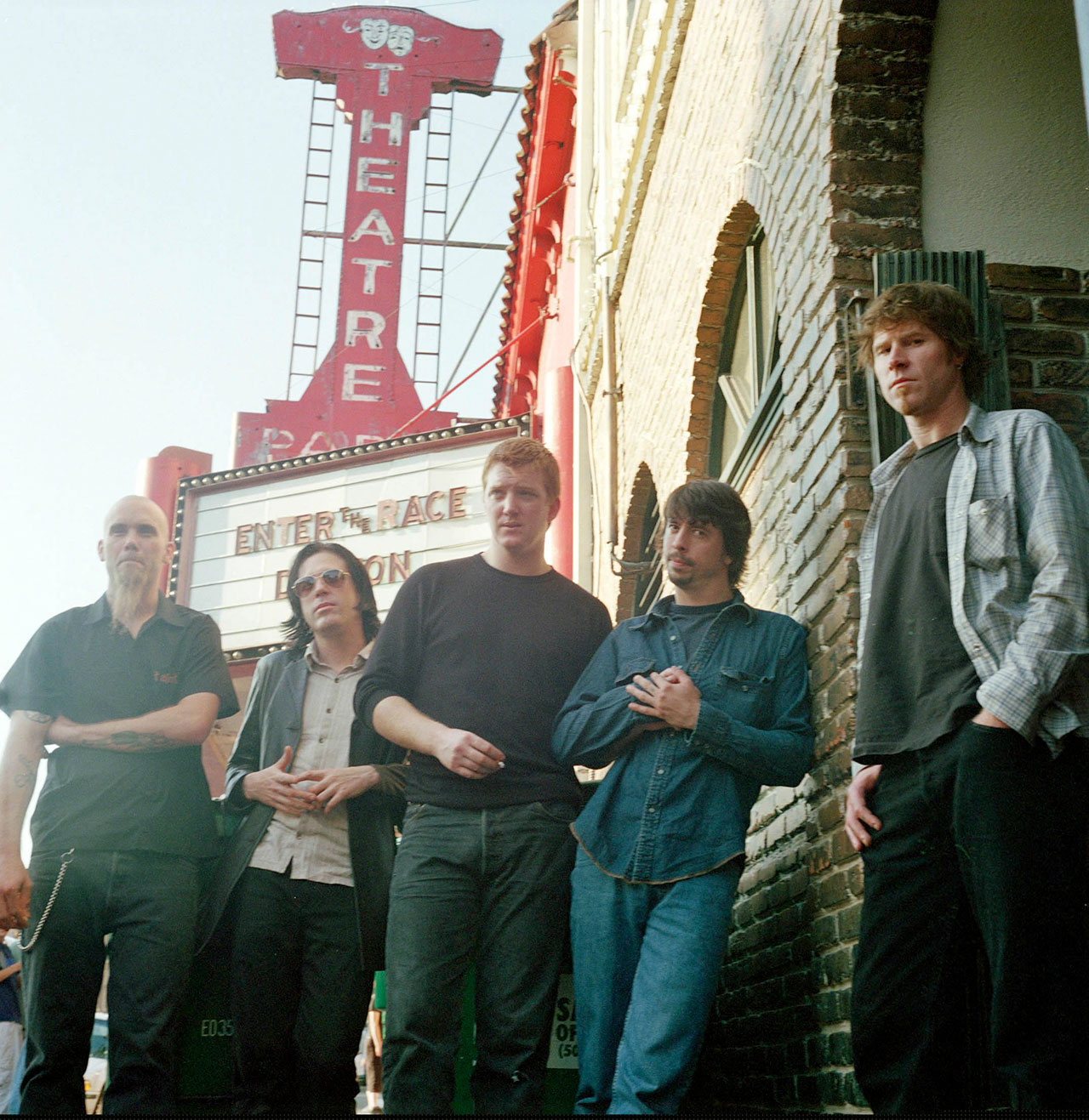It was October 1995, and Josh Homme wanted out. Eight years earlier, the guitarist’s teenage band Kyuss had set out playing generator-powered all-nighters in the Californian desert, their jams punctuated by knife-fights between Mexican gangs and cops wheel-spinning over the dunes.
Later, with this fiercely DIY band now trumpeted as leaders of a tenuous ‘desert-rock’ scene, signed to major label Elektra and schlepping across urban America, 22-year-old Homme felt success stick in his craw. “Kyuss was starting to eat itself,” he shrugged in a post-mortem with LA Weekly. “I was disillusioned. Punk rock had blown up in my face. What I thought it was, was a total lie.”
With Kyuss put in the ground – for now – the ever-contrary Homme set about burning his bridges. A solo deal dangled by Elektra was gleefully sabotaged (“I thought: ‘Well, I’ll sing – that’ll get me kicked off.’ And it did”). Just as obtuse was Homme’s move to Seattle to study, his reasoning being that grunge’s epicentre was now so jaded that there was no risk of him being sucked into another band. ”
The plan worked – for a year. But by 1996 Homme had hooked up with a splinter group of grunge sidemen including Soundgarden’s Ben Shepherd and Matt Cameron, and after Mike Johnson of Dinosaur Jr got him a gig as touring guitarist for the Mark Lanegan-fronted Screaming Trees he stopped resisting the inevitable. “When I was driving the truck on Lollapalooza, I had an epiphany, like, ‘What am I doing, going to school? Who cares if there’s too many bands? Who cares if no one else likes my music?’”
Having put himself “back in the fire”, Homme returned to California with pocketfuls of new songs, ample to feed both the first two volumes of the Desert Sessions series and the self-titled debut album by Queens Of The Stone Age.
Self-financed by Homme and released in 1998, Queens Of The Stone Age was a left-turn away from the sprawling stoner-rock of Kyuss, standouts like Regular John and Avon fusing gritty road-movie guitars with the precision of krautrock and the band leader’s eerie Roy Orbison-inspired croon. Homme described the album as “driving music” or “robot rock”, and revelled in its wider palette. Perhaps the most significant departure was the economy of the Queens material, with Homme pointedly distancing himself from the “wanky thirty-minute opuses” that many Kyuss fans had hoped for to see. “I’ve always been into frustrating some percentage of the audience,” he admitted. “We can’t be the same band forever.”

In fact, Queens and Kyuss had some DNA in common. Flanking Homme on that debut album was his desert-era drummer Alfredo Hernández, and another old face re-entered the frame at that year’s SXSW festival in Texas.
Performing there to a roomful of horrified A&R people with his latest venture, Mondo Generator, Nick Oliveri was evidently still the loosest of cannons. “We walk in,” Homme told Rolling Stone, “and Nick is completely naked except for a pair of black Converse and socks. Then Nick lights this piece of paper on fire, puts something in his mouth and turns around and blows fire right into the audience, right through all these record people, and they’re like, ‘Ahhh!’ I look over at Fredo and I’m like: “I’m calling in Nick right now.’”
With Oliveri on the bus, everything Queens touched turned to controversy, starting with a K-Mart ruckus over the debut album’s crotch-shot sleeve art. In the end they stocked the record, which crawled to silver sales. But it was still an unlikely development when Interscope Records showed an interest. “I think we came to the label because of their ability to push bands like Primus,” said Homme. “Not a band I necessarily like, but they’re really bizarre.”
To their credit, Interscope waved through 2000’s Rated R, an unlikely breakthrough album on which Queens achieved gold sales while keeping the music equal parts diverse and perverse. With Homme often delegating vocals to his crew, it was a schizophrenic record that mulched, ate and puked genres, morphing from the wonky Leg Of Lamb, via the pig-squeal punk of Quick And To The Pointless, to the morose In The Fade.
“It’s still heavy rock music,” Homme said of instrumentation that now included brass and steel drums. “A little more melodic, robotic and psychotic.” Oliveri had a more prosaic take: “We try to take a riff and pound it into people’s heads by doing it over and over again.”
Even so, Rated R might have sunk among the nu metal scene were it not for its two standout tracks. The Lost Art Of Keeping A Secret was dark and propulsive, Homme’s falsetto hook ensuring its crossover success. “Our record company was like: ‘This is going to be a hit,”” he told CD Now. “And I’m like: ‘A hit with whom?’ It’s about fucking. Twenty-one-year-olds and over, maybe. They were trying to shove it down the throat of thirteen-year-olds.”
Feel Good Hit Of The Summer was a drum-scuttling stop/start affair that was off-kilter but electrifying, Homme’s vocal simply cycling through a list of narcotics – nicotine, Valium, Vicodin, marijuana, ecstasy, alcohol, cocaine – supported by a malevolent guest spot from Judas Prist’s Rob Halford who sang backing vocals.
Released as the second single, Feel Good Hit Of The Summer was an inevitable red rag to the Wal-Mart chain – which had initially refused to stock Rated R – and ensured Queens were cast as hellraisers in a damp post-millennial rock scene. While Homme was evasive (“It lists drugs, but it doesn’t say yes or no”), Oliveri claimed the lyrics were a fair snapshot of their ingestion.
With the band’s principal members running on such heavy fuel, perhaps it was no surprise that Queens were earning a dangerous reputation on the road. In 2000 they were a square peg on the Ozzfest bill, with a sardonic Homme informing the teen-mosher crowd that “we’re not angry and we don’t rap” and later reflecting that “Ozzfest was nothing but mullets, Budweiser and free sunburns for everyone”. (Ozzy’s missus Sharon hit back in 2007 with: “I hope his dick fucking falls off so his mother can eat it”.)
For now, Oliveri’s genitals were the talking point, with the bassist’s habitual on-stage nudity getting him arrested at 2001’s Rock In Rio. Another low followed in June, when a notorious set at Germany’s Rock Am Ring was marred by horrific sound and the sight of Homme in a foot cast, on painkillers, butchering a guitar handed to him that was in the wrong tuning.

If Queens seemed outwardly chaotic, the band were prolific writers, and amassed the songs that would give their ascent another kick of speed.
Released in August 2002, Songs For The Deaf would have garnered column inches in any case, given that it featured Dave Grohl on pummelling drums (“Aside from Dave Lombardo of Slayer, he’s the heaviest drummer ever,” Homme offered, “and we realise what that brings to our sound”). But the album’s reputation rests on the material; Homme noted that this third record had “the robotic feel of the first album and the groove-based song structure of the second”.
Few moments in post-millennial alt.rock thrill like the explosive start of You Think I Ain’t Worth A Dollar, But I Feel Like A Millionaire (notable as Oliveri’s first sober vocal). The irresistible single No One Knows rode its jackboot bounce all the way to silver sales, while Lanegan – by this point a resident member – shucked vocal gravel over A Song For The Dead and Hangin’ Tree. Do It Again offered a stomped glam beat and squawked guitar, while Another Love Song tucked poisonous lyrics beneath its spaghetti-western guitars and pop sensibilities. “I got divorced,” Oliveri said of the latter, “so that was a tune that came out. It’s just one of those things about shit that’s going down with you.”
Songs For the Deaf drew listeners even deeper into its frazzled world with a spoof radio concept, with songs book-ended by the inane babble of drive-time DJs. “The radio interludes are supposed to be like the drive from LA to Joshua Tree,” said Homme, “a drive that makes you feel like you’re letting go.”
“We don’t get played on the radio,” Oliveri added of the interludes’ thinly veiled snipe at moronic US jocks, “so I figure we should talk shit about them.”
Oliveri had spoken too soon. The rock media was now dancing to Queens’ tunes, with Rolling Stone putting them among 10 Most Important Hard And Heavy Bands Right Now. But their days seemed numbered. In early 2004, a statement announced that Oliveri had been fired, citing “a number of incidents occurring over the last 18 months [that] have led to the decision that the two can no longer maintain a working partnership in the band”.
No angel himself, Homme was plainly exhausted by his wingman’s antics, the final straw coming when Oliveri pelted beer bottles into the crowd. “Our whole band is full of hard partiers,” Homme told MTV. “We’ve put more people in rehab than Mardi Gras. But when you get drunk, you either get drunk with class or you get drunk like a slobbering, toothless fuck. He’s a tornado, and a tornado just destroys and goes on to the next city. I’m in the tornado clean-up crew, and all I ever see is his detritus and I’m sick of it.”
Oliveri was just as direct in his statement: “The bad news is that Queens Of The Stone Age is no more. I heard it’s now called ‘Queens Lite’. A pure idea has been polluted. It’s funny. A band about an idea? The concept was simple: a rock band, selfless, mindless, ego-free, unprotected, about danger, sex, and no bullshit rock ’n’ roll. You know what happens when a pure and original rock band gets polluted, poisoned by hunger for power and by control issues?” He signed off: “My favourite band is dead.”
It was a sentiment echoed across the rock scene, with some observers questioning whether Queens could ride on without their talismanic troublemaker-in-chief and secondary songwriter. But as the bandleader hunkered down to make Lullabies To Paralyze, he sounded characteristically unruffled: “I gotta be honest. I knew the split was coming, so I wrote everything by myself. And it’s the best shit I’ve ever written. My tank has been fuelled by people saying I couldn’t do it, and I’m gonna show them they’re dead wrong.”

With Lullabies, released in March 2005, Homme pointedly refused to have it ape Songs For The Deaf – “You’ve got to shake all that shit away” – and instead twisted the blueprint of the debut album. Instant highlights included the Crazy Diamond-esque washes of Everybody Knows That You Are Insane, the bluesy stabs of Burn The Witch and the woodblock beat of lead-off single Little Sister. Meanwhile, The Blood Is Love’s twisted waltz and the abrasive Skin On Skin demonstrated that Homme wasn not about to make it easy on fair-weather listeners.
“It reminds me of the same trancey emptiness of the first Queens record,” he explained. “It’s no accident that everything has come full circle. There’s a lot of repetition with falsetto melodies over the top. I want people to shake their ass, shut their eyes and trance out. I want to move people and get the hairs on their arms to stand up.”
Buoyed by the album’s US No.5 success, their highest chart placing to date, Queens kept pushing. By 2007 they were back with fifth album Era Vulgaris, inspired by Homme’s drives through Hollywood, which swept flavours from synth-driven electronica to southern rock into their sound. The angular Sick, Sick, Sick and breakneck garage-thrash of 3’s & 7’s represented Queens at their foot-down best, countered by Into The Hollow’s creepy music-box vibe and the wistful Make It Wit Chu. And if the consensus was that Era Vulgaris wasn’t quite a match for their early catalogue, then Homme could live with that: “It’s a bit crippled and a bit wheezing… but I like scars, y’know?”
He was about to have some of his own. In 2010, complications during routine knee surgery caused Homme’s heart to stop; he claims to have been clinically dead for several minutes before being revived by a defibrillator. It would be the start of a lost period for him. He melted from the rock scene, spent months bedridden and depressed, and considered turning his back on music altogether. “I couldn’t get up for four months,” he explained. “When I did, I hadn’t got a clue what was going on. I didn’t want to play music any more, because I died on an operating table. I didn’t give a shit about little things any more, and music had become a little thing.”
Homme dug deep to oversee a reissue of the band’s debut album – and tour it – but, as he told Classic Rock’s Marcel Anders, when he returned home he found himself sinking into the mire. “It was the hardest three years of my life. I was failing over and over, trying to figure out stuff, feeling a little insecure. But three years of failure was the best thing that could ever happen, because you go: ‘Shit, there’s nowhere to go but up.’ All I really need is insurmountable odds and I’m happy.”
Over coffee and lengthy pep talks from Trent Reznor of Nine Inch Nails, the fog in Homme’s head cleared, and his creative pipeline began flowing again with The Vampyre Of Time And Memory. Even so, the title of sixth album, …Like Clockwork, was a fitting gallows-humour choice for a record that came anything but easy. “I wrote ‘Like Clockwork’ on a piece of paper that stayed on this table in my studio,” Homme told Classic Rock. “Something would go awful and it’d be like, ‘Clockwork!’ Then something would go great and we’d say the same. The album is like a microcosm of the last few years. You’ve got to make it out.”
Indeed, for Homme this wasn’t so much an album launch as an exorcism: “There’s a part of me that’s releasing this record – and I do mean releasing it, and saying goodbye to it, in a way I never have before. I’m saying: ‘Thanks for kicking my ass and I’m so glad to see you go.’”
Given that troubled context, it followed that …Like Clockwork offered a jet-black world view marked by moments of blazing brilliance, from the Bowie-esque If I Had A Tail and the garage-band riffs of My God Is The Sun to the majestic I Appear Missing, an epic, slow-burn masterpiece that was arguably the best thing on the album. Musically, Homme had never sounded so questing, sprinkling electronica, avant-garde rock, strings and synths, and even toying with cabaret on Smooth Sailing. “I never went to West Berlin,” he noted, “but I feel like some of this would have gone over okay there.”
His collaborative instincts had also emerged intact, as evidenced by the album’s a guest list that pinballed between the sublime and ridiculous, from returning lags such as Oliveri, Grohl and Lanegan, to Jake Shears of Scissor Sisters and Elton John. “Elton walks in with a big smile, dressed to the nines, arms wide open,” Homme recalled in The Guardian. “So you just go: ‘Well, how the hell are you doing, babe?’”
Released in June 2013, …Like Clockwork debuted at No.1 on the US Billboard chart, setting in motion the rise to the A-list heights that the band occupy to this day. Right now, on paper, Queens Of The Stone Age are a paid-up mainstream rock band, topping best-album polls with Villains and filling Madison Square Garden on the associated tour. The curious thing is that they still don’t quite feel like one. Twenty years later, these desert rats are still too difficult, dark and dangerous to file alongside alt.rock’s defanged elder statesmen. They remain a travelling circus of rogues, miscreants and outlaws, led by a man who will never be the establishment, however many magazine covers he graces. As Homme drawled in one telling soundbite: “You invited the outsider in – now the outsider’s gonna fuck things up.”

